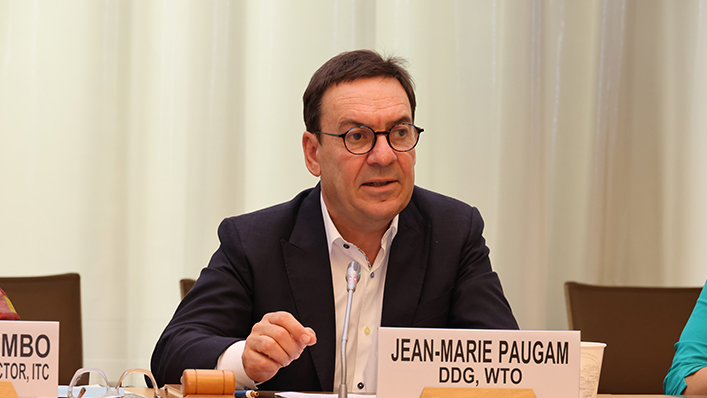
Minister
Ambassadors and colleagues
Ladies and Gentlemen
It is my great pleasure to welcome you to Facilitating Inclusive and Sustainable Trade for our Planet.
My name is Jean-Marie Paugam, and I am WTO’s Deputy Director-General.
We co-organize this event with our close partner, the International Trade Centre.
We are two international trade organizations increasingly working on leveraging trade to contribute to environmental outcomes.
Our work on trade and environment is not only complementary, but we also greatly impact each other’s work.
-WTO’s work is located “upstream,” providing policy and technical expertise on issues at the trade and environment nexus to rule-making.
– ITC’s work is located “downstream,” providing critical technical assistance to a global network of micro, small, and medium sized enterprises (MSMEs) transitioning to greener circular production and trade.
Our objective today is to discuss and identify solutions for how sustainable trade can be facilitated to help companies and governments meet net-zero commitments made in the UN Climate Change Conference in Glasgow – COP26 – in ways that support small businesses and developing countries.
We started planning for this event after Glasgow. Since then trade and environment issues have receive increasing high-level political attention at the WTO and internationally.
-Today 88 WTO members are involved in at least one of three major environment initiatives at the WTO – the Trade and Environmental Sustainability Structured Discussions (TESSD), the Informal Dialogue on Plastics Pollution and Sustainable Plastics Trade (IDP), and Fossil Fuel Subsidy Reform (FFSR).
-The new WTO Agreement on Fisheries Subsides coming out of our Twelfth Ministerial Conference last month marks the first time that WTO members have adopted a multilateral trade deal with environmental issues at its very core.
-Some of our Members have been working on a Trade Ministers’ coalition for Climate.
But the real transition toward a sustainable economy will first and foremost be carried out by the Private Sector. Companies are investing as never before in net-zero strategies, sustainably produced products and decarbonization of global supply chains.
Both public and private efforts translate around the world into an incredible effort to put a price on carbon as well as develop carbon measurement and accounting standards. It is also important to take into account issues of verifiability and certification – and to avoid double counting. This is an unprecedented and most welcome commitment to the green economy.
Yet, from a world trade perspective, this effort is also associated with some challenges.
The most important one is associated with the risk of market fragmentation. For example, more than 60 different carbon pricing schemes already exist globally. Fragmentation coming from these schemes risks generating trade frictions and unpredictability for businesses seeking to decarbonize. It also risks marginalizing developing countries and small businesses, in their efforts to participate to global value chains.
Dear friends, the central purpose of our discussion today is to start looking exactly at this issue: how to best support the global endeavour toward decarbonising and making value chains more sustainable, while at the same time controlling for the undesired risk of fragmentation.
From the outset I would like to suggest two directions about how the WTO and ITC could help in that regard.
First, we must promote the design of coherent and relevant international standards.
I want to think that one day we could have “one global price, one global standard” for Carbon. In the meanwhile, we need to think of ways to promote transparency and work with standard-setting bodies, regulators and stakeholders in order to minimize the risks of divergences and facilitate mutual recognitions. Fragmentation of standards will increase costs, and global tracking and comparisons will become difficult if governments and actors use different metrics.
Second, we must prevent that the most vulnerable players be pushed out of trade and net-zero value chains; we need to assist them into coping with the new sustainable trade standards.
The infrastructure that effectively verifies carbon emissions is highly complex and technical: it is high maintenance, and costly.
Developing countries and small businesses will undoubtedly need support to use relevant international standards and accurately demonstrate the carbon content of their products.
This is where WTO’s Aid for Trade initiative and ITC’s technical assistance comes in.
One word finally about the forthcoming climate agenda. COP 27 which will take place in Sharm el-Sheik, Egypt in 4 months. It will take stock of net-zero implementation. We have an opportunity to feed into this stocktaking exercise. We intend to use the take-away from this event to feed the critical messages we need to bring to the upcoming UN annual climate change conference and also the G20.
Today we have gathered an excellent group of leaders and experts on trade and environment issues, policymakers and heads of small and large businesses, civil society advocates, and partners from around the world.
I will be your moderator for this session’s panel discussion.
Share
Reach us to explore global export and import deals